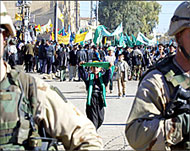Iraq: Shia agree to sign constitution
A senior member of Iraq’s Governing Council has said an agreement is reached with the country’s top Shia Muslim cleric on the terms of an interim constitution and the document will be signed on Monday.

“We have reached an agreement. There is going to be very good news very soon,” Muwaffaq al-Rubaie, a Shia on the 25-member Council, told reporters after emerging from half an hour of talks with Ayat Allah Ali al-Sistani, a reclusive cleric who wields huge influence among Iraq’s Shia majority.
“We are going to sign (the interim constitution) on Monday.”
It was not immediately clear if Rubaie meant al-Sistani had accepted the existing wording of the interim constitution, which was agreed to by the Governing Council last week, or if he had worked out changes to the wording with al-Sistani that would then have to be presented to the rest of the Council.
The interim constitution is crucial to US plans to hand power back to the Iraqis at the end of June.
Two key clauses
The US-appointed Council was due to sign the constitution last Friday, but at the last minute five Shia members refused to sign after it emerged that al-Sistani, a 73-year-old Iranian-born cleric, had objections to two key clauses in the document.
 |
|
Kurds have demonstrated for |
|
|
One objection referred to a clause that would give the Kurds, who make up about a fifth of Iraq’s population, an effective veto over the permanent constitution once it is drawn up after elections next year.
Another involved the make-up of a presidential council.
Currently the document calls for the creation of a three-member council, with one president and two deputies. The Shia have said they now want a five-person council, with three Shia, one Sunni and one Kurd.
The Shia’s objections threatened irreparable damage to the experiment in representative government.
The basic law is aimed at seeing Iraq through a transitional period and into next year. It provides for a federal state with two official languages, where Islam will be a source of legislation, but not the basis for it.